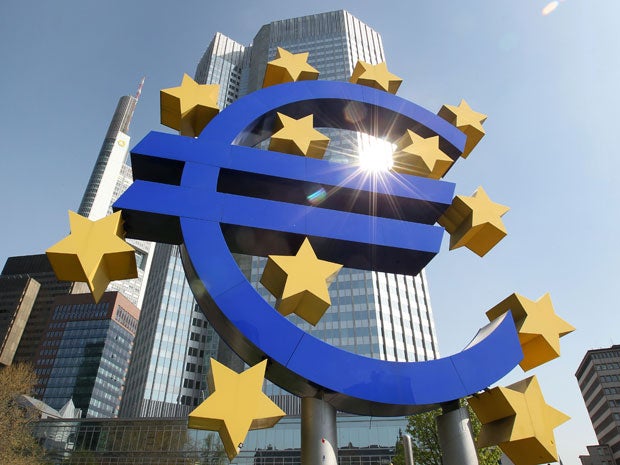The European Central Bank (ECB) has made £446 billion in low-interest loans to banks in the second round of a massive credit infusion that has been credited with easing the eurozone debt crisis.
The offer of credit for three years was taken up by 800 banks today. The uptake was modestly higher than the £413 billion handed out to 523 banks at a first offering on December 21. Banks used some of the money from the first round of loans to buy government bonds.
That lowered borrowing costs for hard-pressed governments struggling to maintain large amounts of debt, and eased fears of a market meltdown from Europe's troubles with too much government debt.
The ECB loans, given against collateral such as bonds or other securities, cost banks the average of the ECB's benchmark rate over the life of the loan, which is currently 1%.
Analysts had expected the amount of new loans to come in just under that for the first offering.
The first offer of three-year, low-interest credit to banks on December 21 has been credited with easing fears of a financial meltdown in the eurozone due to lack of confidence with governments with too much debt and too little growth.
The cash infusion removed fears that banks in Europe might collapse because of inability to pay off bonds or other debt coming due. Following the first credit infusion, bank funding markets frozen late last year began to thaw, as some banks have been able to issue new debt.
More crucially for eurozone governments, some banks in financially-pressed countries such as Italy and Spain appear to have used the cheap money to buy government bonds. That has brought down borrowing costs, especially on shorter-term bonds, and taken some of the pressure off governments such as Spain and Italy.
High borrowing costs are a key driver of the eurozone debt crisis. Greece, Ireland and Portugal all had to turn to other eurozone governments and the International Monetary Fund (IMF) for bailout loans when they could no longer borrow at affordable rates.
The new governments of Spanish prime minister Mariano Rajoy and Italian prime minister Mario Monti are pushing for reforms to their labour markets, aimed at making their economies more productive and business-friendly.
That should increase growth and tax revenues, but the measure will take years to take effect. The ECB cash infusion is seen as buying time for economic reform.
But the first round had less effect on banks' lending to the wider economy. Loans to businesses only stabilised in January after a steep fall in December.
ECB president Mario Draghi encouraged banks to take the credit, saying there was "no stigma" or sign of weakness associated with it and participating was only a "business decision".
Other ECB officials have indicated that markets should not get used to such massive rescue operations from the central bank.
Peter Praet, a member of the six-person executive board and the ECB official responsible for the bank's economists, has said the bank will face a difficult balancing act in judging when to withdraw the additional credit.
ECB governing council member Ewald Nowotny has said he sees no need for further action after the second instalment of loans.
Jens Weidmann, head of the conservative Bundesbank, Germany's central bank, has warned that over-generous liquidity could lead to banks investing in riskier assets.
"The crisis cannot be resolved solely by throwing money at it," Mr Weidmann warned in a speech last week. "While money can buy us time to tackle the crisis, it is imperative that we use that time in order to address its root causes."
Subscribe to Independent Premium to bookmark this article
Want to bookmark your favourite articles and stories to read or reference later? Start your Independent Premium subscription today.


Join our commenting forum
Join thought-provoking conversations, follow other Independent readers and see their replies